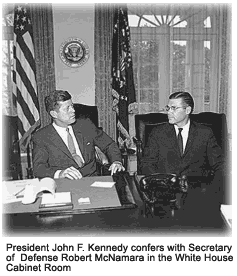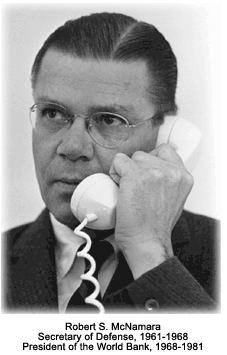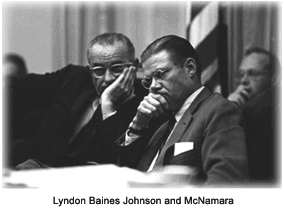Robert S. McNamara was first a success in business, rising to become the first non-family president of the Ford Motor Company, and then as Secretary of Defense, where he applied management methods not seen before in the Defense Department. His legacy is controversial. Although increasingly skeptical of the ability of the United States to win in Vietnam, he never publicly gave support to the anti-war movement.
Robert Strange McNamara was born on June 9, 1916, in San Francisco, California. He graduated from the University of California at Berkeley in 1937 with a degree in economics and philosophy, and then earned a master's degree from Harvard Graduate School in Business Administration. After a stint with Price Waterhouse in San Francisco, he returned to Harvard as an instructor in 1940. He joined the Army Air Forces in 1943 and left after three years of active duty with the rank of lieutenant colonel.
In 1946, McNamara joined Ford as one of the "whiz kids," brought in by Henry Ford II to modernize the company. Advancement was swift. His leadership was critical in remaking the organization along modern lines and on November 9, 1960, one day after John F. Kennedy won the presidential election, he was made president of Ford.
 The job was short-lived. Kennedy's first choice for Secretary of Defense was Robert A. Lovett, who declined and recommended McNamara instead. Kennedy then offered the post to McNamara, who accepted after holding the position at Ford for less than five weeks.
McNamara's approach to defense policy emphasized systems analysis. He averred that while the country could afford any level of expense demanded by national security, it should examine all expenses and ensure that taxpayer money was wisely spent. Numerical analysis was favored and options were considered critically.
Implementing a well-publicized cost reduction program, a number of weapons programs were terminated, among them the B-70 bomber that had been initiated under the Eisenhower administration as a successor to the B-52. McNamara regarded the long-range bomber as inefficient and more vulnerable than the Inter-Continental Ballistic Missile (ICBM). He also ended the Skybolt project, which was to produce a ballistic missile with a 1,000-nautical-mile range that could be launched from a B-52 bomber. Here McNamara's objections were to expense, inaccuracy, and the development time. His five-year program was touted as saving $7 million dollars beginning in 1961. Under much criticism from Congressional members, many military bases and installations also were deemed unnecessary for national defense and closed.
On the other hand, McNamara pushed the TFX program, which later became the F-111. The plane was designed to meet the needs of both the Navy and Air Force, and the contract was awarded to General Dynamics, while the Air Force and Navy maintained the position that separate planes to be built by Boeing. While some regarded the TFX as a failure for the Navy, the F-111 was a mainstay of the Air Force for decades.
The job was short-lived. Kennedy's first choice for Secretary of Defense was Robert A. Lovett, who declined and recommended McNamara instead. Kennedy then offered the post to McNamara, who accepted after holding the position at Ford for less than five weeks.
McNamara's approach to defense policy emphasized systems analysis. He averred that while the country could afford any level of expense demanded by national security, it should examine all expenses and ensure that taxpayer money was wisely spent. Numerical analysis was favored and options were considered critically.
Implementing a well-publicized cost reduction program, a number of weapons programs were terminated, among them the B-70 bomber that had been initiated under the Eisenhower administration as a successor to the B-52. McNamara regarded the long-range bomber as inefficient and more vulnerable than the Inter-Continental Ballistic Missile (ICBM). He also ended the Skybolt project, which was to produce a ballistic missile with a 1,000-nautical-mile range that could be launched from a B-52 bomber. Here McNamara's objections were to expense, inaccuracy, and the development time. His five-year program was touted as saving $7 million dollars beginning in 1961. Under much criticism from Congressional members, many military bases and installations also were deemed unnecessary for national defense and closed.
On the other hand, McNamara pushed the TFX program, which later became the F-111. The plane was designed to meet the needs of both the Navy and Air Force, and the contract was awarded to General Dynamics, while the Air Force and Navy maintained the position that separate planes to be built by Boeing. While some regarded the TFX as a failure for the Navy, the F-111 was a mainstay of the Air Force for decades.
 In international affairs, McNamara played key roles in both the Kennedy and Johnson administrations. McNamara supported President Kennedy during the unsuccessful Bay of Pigs Invasion in April 1961, much to his regret. He also was a member of the Executive Committee that advised Kennedy during the Cuban Missile Crisis of October 1962. Regarding the outcome of the missile crisis, McNamara said that its success "demonstrated the readiness of our armed forces to meet a sudden emergency" and "highlighted the importance of maintaining a properly balanced defense establishment."
In keeping with the idea of flexible response rather than just massive retaliation, McNamara urged increases in the number of military personnel. Having fallen by a million men from the end of the Korean War to 1961, McNamara quickly built forces back up by 300,000 to more than 2.8 million in 1962. The demands of the Vietnam War caused that figure to continue to rise, reaching 3.5 million by mid-1968, just after McNamara left office.
As more and more American troops went to Vietnam and after many first-hand visits to Vietnam, McNamara privately grew skeptical about whether the war could be won. As public speculation about his differences with the Johnson Administration and the Joint Chiefs of Staff grew, pressure on him increased, but he refused to openly criticize the war effort.
On February 29, 1968, McNamara's term ended. The president explained that McNamara needed a change after serving as secretary of defense for seven years — longer than anyone else had served — and that the secretary had an opportunity to head the World Bank. Nevertheless, it was generally acknowledged that the president had lost confidence in him.
In international affairs, McNamara played key roles in both the Kennedy and Johnson administrations. McNamara supported President Kennedy during the unsuccessful Bay of Pigs Invasion in April 1961, much to his regret. He also was a member of the Executive Committee that advised Kennedy during the Cuban Missile Crisis of October 1962. Regarding the outcome of the missile crisis, McNamara said that its success "demonstrated the readiness of our armed forces to meet a sudden emergency" and "highlighted the importance of maintaining a properly balanced defense establishment."
In keeping with the idea of flexible response rather than just massive retaliation, McNamara urged increases in the number of military personnel. Having fallen by a million men from the end of the Korean War to 1961, McNamara quickly built forces back up by 300,000 to more than 2.8 million in 1962. The demands of the Vietnam War caused that figure to continue to rise, reaching 3.5 million by mid-1968, just after McNamara left office.
As more and more American troops went to Vietnam and after many first-hand visits to Vietnam, McNamara privately grew skeptical about whether the war could be won. As public speculation about his differences with the Johnson Administration and the Joint Chiefs of Staff grew, pressure on him increased, but he refused to openly criticize the war effort.
On February 29, 1968, McNamara's term ended. The president explained that McNamara needed a change after serving as secretary of defense for seven years — longer than anyone else had served — and that the secretary had an opportunity to head the World Bank. Nevertheless, it was generally acknowledged that the president had lost confidence in him.
 After vacating the office, McNamara was awarded the Medal of Freedom and the Distinguished Service Medal by President Johnson. The former secretary also wrote five books, including: The Essence of Security shortly after leaving the Pentagon and In Retrospect: The Tragedy and Lessons of Vietnam, which was published in 1995. In the latter book, McNamara outlined the mistakes made during the Vietnam War, for which he expressed his guilt and regret.
McNamara remained at the World Bank until 1981, when he retired. Since that time, he has served on boards of directors for corporations and non-profit organizations. He continues to speak and write about many such topics as: population and development, world hunger, the environment, East-West relations, nuclear arms, and his vision for the United States in the 21st century. Although many would argue that McNamara had numerous differences of opinion with Congress and military officials, few would argue that the changes he made within the Department of Defense had a lasting effect.
After vacating the office, McNamara was awarded the Medal of Freedom and the Distinguished Service Medal by President Johnson. The former secretary also wrote five books, including: The Essence of Security shortly after leaving the Pentagon and In Retrospect: The Tragedy and Lessons of Vietnam, which was published in 1995. In the latter book, McNamara outlined the mistakes made during the Vietnam War, for which he expressed his guilt and regret.
McNamara remained at the World Bank until 1981, when he retired. Since that time, he has served on boards of directors for corporations and non-profit organizations. He continues to speak and write about many such topics as: population and development, world hunger, the environment, East-West relations, nuclear arms, and his vision for the United States in the 21st century. Although many would argue that McNamara had numerous differences of opinion with Congress and military officials, few would argue that the changes he made within the Department of Defense had a lasting effect.